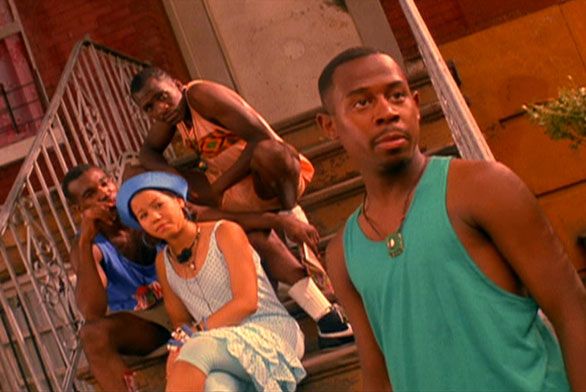Annapolis Johnnies Tackle a Timeless Question: What Does it Mean to ‘Do the Right Thing?’
February 5, 2024 | By Meliha Anthony
Most Friday nights in Annapolis, students flock to the Key Auditorium or the Great Hall to hear from visiting scholars, musicians, artists, or faculty as part of the school’s Formal Lecture and Concert Series. The evening of Friday, January 12, looked a little different as the polity gathered for a showing of Spike Lee’s 1989 film Do the Right Thing and a subsequent schoolwide dialogue: the all-college seminar.

All-college seminars are a unique opportunity for Johnnies to engage in conversation with people they would not otherwise encounter in class. Held about once per semester during the usual Friday night lecture slot, these seminars are optional discussions about a non-Program text—or in this case, a film. While Friday night lectures are open to the public, all-college seminars are exclusive to students, staff, and faculty. Typically, they are hosted and organized by the Student Committee on Instruction (SCI); this event, however, was hosted by Assistant Dean Robert Abbott’s office in honor of Martin Luther King Jr. Day.
Do the Right Thing takes place during a heat wave in Brooklyn in the late 1980s, where African American residents notice that the Italian owners of a local pizzeria refuse to put up photos of Black celebrities among the famous Italian Americans on the restaurant’s Wall of Fame. Tensions rise, culminating in the murder of a Black man by the police after riots and fights break out between the neighborhood’s two communities.
After briefly gathering as a college, tutor George Russell offered an opening question– “What does it mean to do the right thing?”–and students and faculty dispersed into several groups to discuss the movie. “One of the crazy things about all-college seminars is you get the opportunity to have all of the members of the community,” says Tasos Katakos (A25), explaining that Annapolis President Nora Demleitner participated in his seminar, along with four tutors and students from other class years. “That’s really important too, right? It’s open for everybody.”
St. John’s is perhaps notorious for holding classes daily during the academic year (there are rarely cancellations because of weather, or, for that matter, federal holidays). For important observances such as Martin Luther King Jr. Day, though, Assistant Dean Abbott says, “We have found ways to use the occasion to do something good that is harmonious or consonant with what we’re doing at the college.” Celebrations in past years have included performances and lectures, seminars on texts such as King’s “Letter from a Birmingham Jail,” and partnerships with the Dr. Martin Luther King Jr. Committee of Anne Arundel County.
Abbott notes that Do the Right Thing is perhaps an unusual pick for a St. John’s discussion, given both its medium–a film instead of a book–and the contemporary narrative, two things rarely encountered by students during their time in the Program. However, the film “raises in an excellent way, in the way a good book does, a number of really pressing important human questions,” including what it means to be a good neighbor and the differences between Martin Luther King, Jr. and Malcolm X’s beliefs.
Katakos views these non-Program events as opportunities to address important social issues. “I [wasn’t] sure how [modern texts and films] would work at St. John’s,” Katakos says. But, he adds, “There are certain things that could be discussed, and race is a very important topic.”
Given that modern political issues do not typically play a key role in campus conversations, Do the Right Thing is an anomaly for the college and has an added layer of relevance, being grounded in topics that tangibly impact us today. Helen Felbek (A25) notes that our study of classic texts can cause us to “see ourselves as this insular community. I’m not saying that the great books are not relevant for today … but it’s easier to distance yourself from them. Aristotle wrote 2,000 years ago, right?”
In every seminar and tutorial at St. John’s, students come into the conversation with differing backgrounds and experiences that influence their perception of a text. This dynamic becomes apparent when dealing with a more contemporary, explicitly political narrative such as Do the Right Thing. As in all things, there is a learning curve. Yet Johnnies all share a foundation in each of these conversations, regardless of the topic: “The one thing we have in common is the text, or the film,” says Felbek. “So why should I treat it differently from other texts?”
Felbek was struck by this ability to treat issues raised in the film the same as any Program text in class: “We have people who … train to engage with a text in a specific way,” Felbek says, addressing how students become adept at analyzing classic texts as standalone objects without falling back on modern political terminology. “It was actually hopeful and nice that that method would work for a movie and for something more contemporary and closer to people’s real life.” Ultimately, narratives like Do the Right Thing share a similarity with the Program in that they ask important questions about life and the human condition.
Abbott, Katakos, and Felbek emphasize the value of all-college seminars and how they enrich academic life. “It would be nice to have more of these events,” Felbek says, “because they’re [about] political issues that don’t really come up in the great books.”

